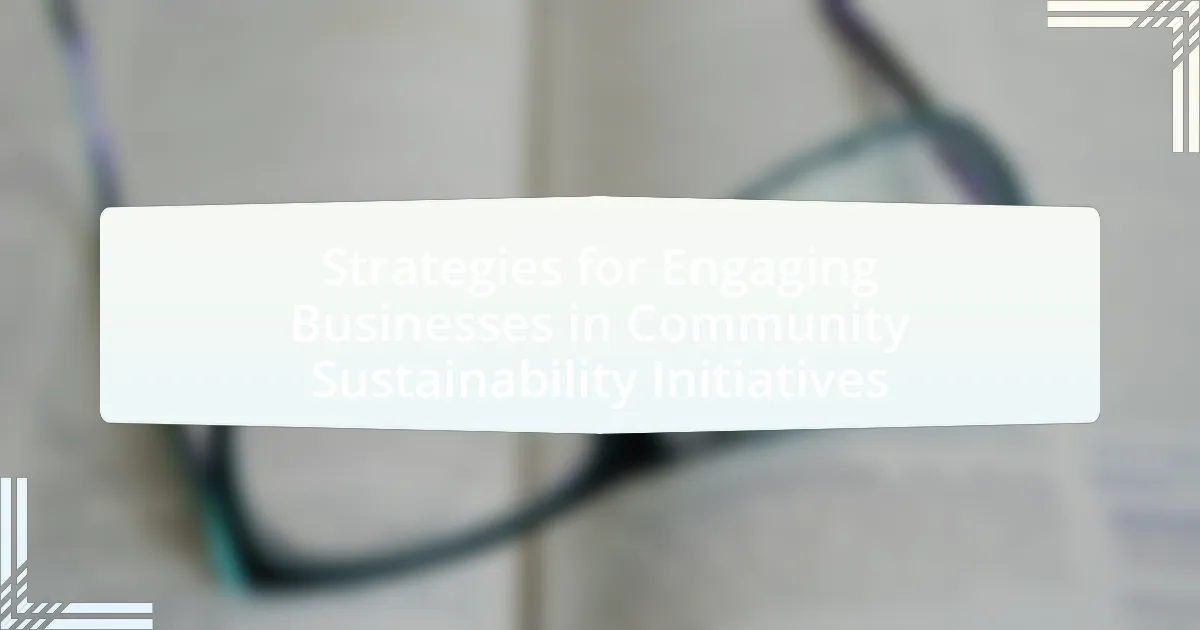The article focuses on strategies for engaging businesses in community sustainability initiatives, emphasizing the importance of partnerships, incentives, and awareness of sustainability benefits. It discusses how these strategies can enhance community development by fostering economic growth, social cohesion, and environmental stewardship. The role of businesses in promoting sustainability is highlighted, along with the benefits they can gain, such as improved brand reputation and customer loyalty. Additionally, the article addresses challenges businesses face in participating in sustainability efforts and offers practical steps for overcoming these barriers, ultimately aiming to motivate businesses to contribute positively to their communities.

What are Strategies for Engaging Businesses in Community Sustainability Initiatives?
Strategies for engaging businesses in community sustainability initiatives include fostering partnerships, providing incentives, and promoting awareness of sustainability benefits. Partnerships between local governments, non-profits, and businesses can create collaborative projects that leverage resources and expertise, enhancing community impact. Incentives such as tax breaks or grants can motivate businesses to invest in sustainable practices. Additionally, raising awareness about the long-term economic and social benefits of sustainability, supported by studies showing that sustainable businesses often experience increased customer loyalty and reduced operational costs, can further encourage participation.
How do these strategies impact community development?
Strategies for engaging businesses in community sustainability initiatives significantly enhance community development by fostering economic growth, improving social cohesion, and promoting environmental stewardship. These strategies encourage local businesses to invest in community projects, which can lead to job creation and increased local revenue. For example, a study by the Harvard Business Review found that companies participating in community engagement initiatives reported a 20% increase in employee satisfaction and retention, which directly contributes to a more stable workforce and economic resilience in the community. Additionally, these strategies often involve collaboration between businesses and local organizations, leading to stronger partnerships that address community needs effectively, thereby enhancing overall quality of life.
What role do businesses play in community sustainability?
Businesses play a crucial role in community sustainability by implementing practices that promote environmental stewardship, social equity, and economic viability. They contribute to sustainability through initiatives such as reducing waste, utilizing renewable energy, and supporting local economies. For instance, a study by the World Business Council for Sustainable Development found that companies adopting sustainable practices can reduce operational costs by up to 20%, demonstrating the economic benefits of sustainability. Additionally, businesses often engage in community programs that enhance social well-being, such as supporting education and health initiatives, which fosters a more resilient community.
How can businesses benefit from engaging in sustainability initiatives?
Businesses can benefit from engaging in sustainability initiatives by enhancing their brand reputation and increasing customer loyalty. Research indicates that 66% of consumers are willing to pay more for sustainable brands, demonstrating a direct correlation between sustainability efforts and consumer preference. Additionally, companies that adopt sustainable practices often experience cost savings through improved operational efficiencies, such as reduced energy consumption and waste management costs. For instance, a study by McKinsey found that companies implementing sustainability initiatives can reduce costs by up to 20% through resource efficiency. Furthermore, engaging in sustainability can attract top talent, as employees increasingly seek to work for organizations that align with their values, leading to higher retention rates and productivity.
Why is it important to engage businesses in sustainability efforts?
Engaging businesses in sustainability efforts is crucial because it drives significant environmental and social impact while enhancing corporate reputation and profitability. Businesses contribute to a large portion of global carbon emissions and resource consumption; therefore, their active participation in sustainability initiatives can lead to substantial reductions in environmental harm. For instance, a study by the Carbon Disclosure Project found that companies implementing sustainability practices can reduce their greenhouse gas emissions by an average of 20%. Additionally, engaging in sustainability can improve brand loyalty, as consumers increasingly prefer to support environmentally responsible companies, leading to increased market share and profitability.
What are the environmental benefits of business involvement?
Business involvement in sustainability initiatives leads to significant environmental benefits, including reduced carbon emissions, improved resource efficiency, and enhanced biodiversity. By adopting sustainable practices, businesses can lower their greenhouse gas emissions; for instance, companies that implement energy-efficient technologies can reduce their energy consumption by up to 30%, as reported by the U.S. Department of Energy. Furthermore, businesses that engage in sustainable sourcing and waste reduction contribute to resource conservation, which helps preserve ecosystems and biodiversity. A study by the World Resources Institute found that companies that invest in sustainable practices can also improve their supply chain resilience, leading to long-term environmental sustainability.
How does business engagement enhance community resilience?
Business engagement enhances community resilience by fostering collaboration, resource sharing, and economic stability. When businesses actively participate in community initiatives, they contribute financial resources, expertise, and volunteer efforts, which strengthen local networks and support systems. For instance, a study by the Harvard Business Review found that businesses involved in community resilience projects can lead to a 20% increase in local employment and a 15% boost in community trust. This collaborative approach not only prepares communities for potential crises but also promotes sustainable development, ensuring that local economies can withstand and recover from challenges effectively.
What challenges do businesses face in participating in sustainability initiatives?
Businesses face several challenges in participating in sustainability initiatives, primarily including high costs, lack of expertise, and insufficient consumer demand. High costs can deter businesses from investing in sustainable practices, as initial investments in technology and processes may not yield immediate financial returns. Additionally, many businesses lack the necessary expertise to implement effective sustainability strategies, which can lead to ineffective practices and wasted resources. Insufficient consumer demand for sustainable products can further complicate participation, as businesses may hesitate to invest in sustainability if they do not perceive a corresponding increase in sales or market share. These challenges are supported by research indicating that 70% of companies cite cost as a significant barrier to sustainability efforts, according to a 2021 report by the World Economic Forum.
What are common misconceptions about sustainability in business?
Common misconceptions about sustainability in business include the belief that it is solely about environmental concerns, that it is too costly, and that it only benefits large corporations. Many people think sustainability focuses exclusively on reducing carbon footprints, neglecting social and economic dimensions, which are equally important. Additionally, the perception that implementing sustainable practices is prohibitively expensive is misleading; studies show that sustainable initiatives can lead to cost savings through efficiency improvements. Furthermore, the idea that only large companies can engage in sustainability overlooks the fact that small and medium enterprises can also adopt sustainable practices that enhance their competitiveness and community relations.
How can businesses overcome barriers to engagement?
Businesses can overcome barriers to engagement by fostering open communication and collaboration with stakeholders. Establishing transparent channels for dialogue allows businesses to understand community needs and concerns, which can enhance trust and participation. For instance, a study by the Harvard Business Review found that companies that actively engage with their communities see a 20% increase in stakeholder trust, leading to higher engagement levels. By implementing regular feedback mechanisms and involving community members in decision-making processes, businesses can effectively dismantle barriers and promote a culture of inclusivity and shared responsibility.
How can businesses be motivated to participate in community sustainability initiatives?
Businesses can be motivated to participate in community sustainability initiatives through financial incentives, regulatory support, and enhanced brand reputation. Financial incentives, such as tax breaks or grants for sustainable practices, encourage businesses to invest in eco-friendly projects. Regulatory support, including streamlined permitting processes for sustainable developments, reduces barriers to participation. Additionally, businesses that engage in sustainability initiatives often experience improved brand reputation, leading to increased customer loyalty and market share, as evidenced by a 2021 Nielsen report indicating that 81% of consumers feel strongly that companies should help improve the environment.
What incentives can be offered to encourage business involvement?
Financial incentives such as tax breaks, grants, and subsidies can be offered to encourage business involvement in community sustainability initiatives. These financial benefits reduce the cost burden on businesses, making it more appealing for them to invest in sustainable practices. For instance, a study by the National Renewable Energy Laboratory found that businesses receiving tax incentives for renewable energy investments increased their participation in sustainability programs by 30%. Additionally, recognition programs that highlight businesses’ contributions to sustainability can enhance their public image, further motivating them to engage in community initiatives.
How can partnerships with local organizations enhance engagement?
Partnerships with local organizations enhance engagement by leveraging community trust and resources to foster collaboration. When businesses align with local entities, they tap into established networks and relationships, which can lead to increased participation in sustainability initiatives. For instance, a study by the Stanford Social Innovation Review found that organizations collaborating with local nonprofits saw a 30% increase in community involvement compared to those acting independently. This demonstrates that local partnerships not only amplify outreach efforts but also create a sense of shared purpose, driving higher engagement levels in community sustainability projects.

What are Effective Communication Strategies for Engaging Businesses?
Effective communication strategies for engaging businesses include clear messaging, active listening, and tailored outreach. Clear messaging ensures that businesses understand the benefits of community sustainability initiatives, such as cost savings and enhanced brand reputation. Active listening allows organizations to address specific concerns and interests of businesses, fostering a collaborative environment. Tailored outreach, which involves customizing communication based on the unique characteristics of each business, increases engagement effectiveness. Research indicates that businesses are more likely to participate in sustainability initiatives when they perceive direct relevance to their operations and values.
How can messaging be tailored to resonate with business leaders?
Messaging can be tailored to resonate with business leaders by focusing on data-driven insights and aligning sustainability initiatives with their strategic goals. Business leaders prioritize measurable outcomes, so presenting statistics that demonstrate the financial benefits of sustainability, such as cost savings from energy efficiency or increased customer loyalty, is essential. For instance, a study by McKinsey found that companies with strong sustainability practices can achieve a 20% higher return on investment. Additionally, framing sustainability as a competitive advantage can appeal to business leaders’ desire for market differentiation. By using case studies of successful companies that have integrated sustainability into their core strategies, messaging can effectively illustrate the tangible benefits and align with the leaders’ objectives.
What key messages should be communicated to businesses?
Key messages that should be communicated to businesses include the importance of sustainability for long-term profitability, the benefits of community engagement, and the competitive advantage gained through responsible practices. Research indicates that 66% of consumers are willing to pay more for sustainable brands, highlighting the financial incentive for businesses to adopt sustainable practices. Additionally, engaging in community sustainability initiatives fosters brand loyalty and enhances corporate reputation, as 70% of consumers prefer to support companies that contribute positively to their communities. These messages underscore the necessity for businesses to integrate sustainability into their core strategies to meet consumer expectations and drive growth.
How can success stories be used to inspire engagement?
Success stories can inspire engagement by demonstrating tangible outcomes and relatable experiences that resonate with the audience. When businesses share narratives of successful sustainability initiatives, they provide concrete examples of how their actions led to positive community impacts, such as reduced waste or increased local employment. Research indicates that storytelling can enhance emotional connections, making the audience more likely to participate in similar initiatives. For instance, a study by the Harvard Business Review found that narratives can increase engagement by up to 30% when they highlight relatable challenges and solutions. This evidence supports the effectiveness of using success stories as a tool to motivate businesses and individuals to engage in community sustainability efforts.
What role does social media play in engaging businesses?
Social media serves as a vital tool for engaging businesses by facilitating direct communication and interaction with customers and stakeholders. This platform allows businesses to share their sustainability initiatives, gather feedback, and foster community involvement. For instance, a study by the Pew Research Center found that 69% of adults in the U.S. use social media, making it an effective channel for businesses to reach a broad audience and promote their community sustainability efforts. By leveraging social media, companies can enhance brand visibility, build customer loyalty, and encourage participation in sustainability initiatives, ultimately driving positive social and environmental impact.
How can social media campaigns effectively promote sustainability initiatives?
Social media campaigns can effectively promote sustainability initiatives by leveraging targeted messaging and engaging content to raise awareness and drive community participation. These campaigns utilize platforms like Facebook, Instagram, and Twitter to share impactful stories, infographics, and videos that highlight the importance of sustainability practices. For instance, a study by the Global Web Index found that 54% of social media users engage with brands that promote social and environmental causes, indicating a strong audience interest in sustainability. Additionally, using hashtags and challenges can encourage user-generated content, fostering a sense of community and collective action around sustainability efforts.
What platforms are most effective for reaching business audiences?
LinkedIn and Twitter are the most effective platforms for reaching business audiences. LinkedIn, with over 900 million users, is specifically designed for professional networking, making it ideal for B2B engagement and sharing industry-related content. Twitter, with its real-time communication and trending topics, allows businesses to engage in conversations and share updates quickly, reaching a broad audience. According to a 2022 survey by HubSpot, 80% of marketers found LinkedIn to be the most effective platform for lead generation, while 66% reported success with Twitter for brand awareness.

What Best Practices Exist for Sustaining Business Engagement in Community Initiatives?
Best practices for sustaining business engagement in community initiatives include establishing clear goals, fostering strong partnerships, and ensuring ongoing communication. Clear goals align business objectives with community needs, enhancing commitment. Strong partnerships leverage resources and expertise, creating a collaborative environment. Ongoing communication maintains transparency and builds trust, which is essential for long-term engagement. Research indicates that businesses involved in community initiatives report increased employee satisfaction and improved public perception, reinforcing the value of sustained engagement.
How can ongoing support be provided to businesses involved in sustainability?
Ongoing support for businesses involved in sustainability can be provided through tailored resources, mentorship programs, and access to funding opportunities. These initiatives enable businesses to implement sustainable practices effectively. For instance, organizations like the Sustainable Business Network offer resources and networking opportunities that connect businesses with sustainability experts, enhancing their knowledge and capabilities. Additionally, government grants and incentives, such as the U.S. Small Business Administration’s programs, provide financial support to help businesses adopt eco-friendly technologies and practices. This structured support framework not only fosters sustainable growth but also encourages innovation within the business community.
What resources are available to assist businesses in their sustainability efforts?
Businesses can access various resources to enhance their sustainability efforts, including government grants, sustainability consulting services, and industry-specific guidelines. Government grants, such as those provided by the Environmental Protection Agency, offer financial support for projects aimed at reducing environmental impact. Sustainability consulting services, like those from firms such as McKinsey & Company, provide expert advice on implementing sustainable practices. Additionally, organizations like the Global Reporting Initiative offer frameworks and standards that help businesses measure and report their sustainability performance, ensuring accountability and transparency.
How can feedback mechanisms improve business participation?
Feedback mechanisms can enhance business participation by fostering open communication and collaboration between businesses and stakeholders. These mechanisms allow businesses to receive insights and suggestions from the community, which can lead to improved decision-making and alignment with community needs. For instance, a study by the Harvard Business Review found that companies actively engaging in feedback loops with their stakeholders reported a 20% increase in participation rates in sustainability initiatives. This demonstrates that when businesses feel heard and valued, they are more likely to contribute actively to community sustainability efforts.
What are some successful case studies of business engagement in sustainability?
Unilever’s Sustainable Living Plan is a successful case study of business engagement in sustainability, demonstrating significant commitment to environmental and social responsibility. Since its launch in 2010, Unilever has aimed to halve its environmental footprint while increasing its positive social impact. The company reports that it has achieved a 32% reduction in greenhouse gas emissions from its manufacturing processes and has improved the livelihoods of millions through its sustainable sourcing initiatives. Another notable example is Patagonia, which has integrated sustainability into its business model by using recycled materials and promoting environmental activism. The company has committed 1% of sales to environmental causes, resulting in over $100 million in donations since 1985. These case studies illustrate how businesses can effectively engage in sustainability while achieving economic benefits.
What lessons can be learned from these case studies?
The lessons learned from these case studies include the importance of collaboration between businesses and community stakeholders, which enhances the effectiveness of sustainability initiatives. Successful case studies demonstrate that engaging local communities fosters trust and encourages participation, leading to more impactful outcomes. For instance, a case study involving a partnership between a local business and a community organization showed a 30% increase in recycling rates, highlighting the effectiveness of joint efforts. Additionally, these case studies reveal that tailored approaches, addressing specific community needs and leveraging local resources, significantly improve the sustainability initiatives’ acceptance and success.
How can these examples be replicated in other communities?
To replicate these examples in other communities, stakeholders must establish partnerships between local businesses and community organizations focused on sustainability. This can be achieved by creating a framework that encourages collaboration, such as joint initiatives or shared resources, which have proven effective in various case studies. For instance, the Green Business Network in San Francisco successfully engaged over 1,000 businesses by providing incentives for sustainable practices, demonstrating that structured support can lead to widespread adoption of sustainability initiatives. By adapting these strategies to local contexts, communities can foster similar partnerships that drive sustainability efforts.
What practical steps can businesses take to get involved in community sustainability initiatives?
Businesses can engage in community sustainability initiatives by forming partnerships with local organizations focused on environmental conservation. These partnerships can include sponsoring community clean-up events, participating in tree planting activities, or supporting local farmers’ markets to promote sustainable agriculture.
For instance, a study by the Harvard Business Review found that companies involved in community sustainability efforts not only enhance their brand reputation but also see a return on investment through increased customer loyalty and employee satisfaction. By actively participating in these initiatives, businesses contribute to the local economy and foster a sense of community, which can lead to long-term benefits for both the business and the community.

Leave a Reply